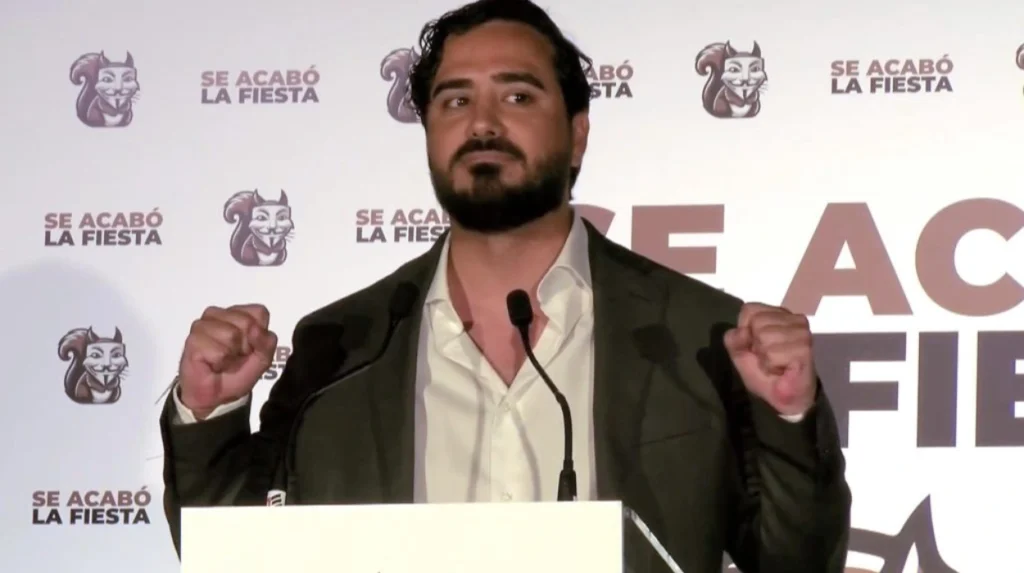Spanish Member of the European Parliament (MEP) Luis “Alvise” Pérez Fernández has officially launched a new far-right political party in Spain, Se Acabó La Fiesta (SALF), marking a significant development in Spain’s political landscape characterized by rising fragmentation and growing appeal of nationalist populism. The party’s formal establishment on October 12, 2025, comes after its initial formation as an electoral grouping in 2024, with ambitions to contest Spain’s upcoming general elections and shake the country’s traditional political order.
Pérez, a controversial figure born in Seville in 1990, is known for his massive online following — boasting over a million followers on Instagram and hundreds of thousands on Telegram — and provocative rhetoric targeting immigration, political elites, and established institutions. His evolution from a center-right political analyst to a leader of one of Spain’s most radical far-right movements reflects ongoing political shifts in Spain and Europe.
Origins and Political Rise of Luis “Alvise” Pérez
Luis Pérez started his political career within the liberal and center-right spectrum, including time spent with the Liberal Democrats in the UK and Spain’s Citizens (Ciudadanos) party, where he served as chief of staff to Valencian leader Toni Cantó. His departure from Ciudadanos in 2019 followed controversies over inflammatory statements made on social media that led to his growing prominence as an alt-right figure during the COVID-19 pandemic.
In February 2024, Pérez announced his candidacy for the European Parliament to secure parliamentary immunity amid multiple ongoing legal cases. Unable to name a party after himself due to Spanish electoral laws, he founded the grouping Se Acabó La Fiesta (SALF), collecting more than 136,000 signatures—far exceeding the legal requirement to run.
SALF’s 2024 European Parliament campaign eschewed traditional rallies, instead relying heavily on Pérez’s vast social media community. The platform featured bold populist promises such as a monthly raffle of Pérez’s MEP salary to supporters and a potential referendum on Spain exiting the European Union.
Party Platform and Core Policies
SALF’s political platform is anchored in a hardline anti-immigration agenda, pledging what Pérez described as “the biggest deportation plan in Spain’s recent history,” targeting illegal immigrants and those convicted of crimes. The party proposes financing these measures by freezing foreign aid, reflecting a nationalist prioritization of domestic concerns over international obligations.
Beyond immigration, SALF promises sweeping tax cuts aimed at reviving support from conservatives disenchanted with Spain’s current tax regime. Pérez criticizes Spain’s political system as corrupt and failing its citizens, vowing to dismantle entrenched political and judicial elites.
In his launch speech at Madrid’s Vistalegre auditorium, Pérez declared,
“Se Acabó La Fiesta — The Party’s Over. Spain deserves security, sovereignty, and respect for its citizens.”
This call to national pride and order resonates with many voters frustrated by economic challenges and perceived threats to traditional Spanish identity.
Political and Legal Challenges Facing SALF
Despite its rapid rise, SALF and Pérez confront significant hurdles. Pérez faces multiple legal investigations for offenses including alleged illegal political funding and public statements deemed hate speech. These legal challenges contribute to the party’s controversial profile but also fuel its anti-establishment appeal.
SALF’s formal transformation into a political party enables it to contest more elections and build institutional strength. However, the party’s confrontational style and incendiary rhetoric risk alienating moderate voters and hindering broader acceptance.
Established far-right party VOX, Spain’s main force on the nationalist right, views SALF’s rise with concern. VOX emphasizes a more institutionalized approach and maintains support for Spain’s judiciary and media, while Pérez openly criticizes these entities as part of the corrupt elite. This rivalry could lead to a fragmented far-right vote in upcoming elections.
Broader Context: Far-Right Surge in Spain and Europe
Spain has historically resisted far-right breakthroughs compared to other EU countries, but SALF’s appearance indicates changing political dynamics. Analysts note SALF’s unique use of social media savvy combined with radical populism as a new phenomenon that unsettles Spain’s political ecosystem.
This movement fits within a European-wide resurgence of nationalist and right-wing populist parties promoting immigration restrictions, euroscepticism, and anti-establishment sentiments. SALF’s founder cites inspiration from Latin American populists such as Nayib Bukele and Javier Milei, emphasizing outsider politics and direct voter engagement through digital platforms.
Political analyst Dr. Juan Pablo Moreno-Torres describes SALF as “more aggressive than previous Spanish far-right parties,” distinguishing it by its social media reach and confrontational tactics.
Electoral Outlook and Impact
SALF’s potential impact in forthcoming Spanish general elections remains uncertain but is expected to reshape right-wing politics. The party energizes voters disillusioned with mainstream parties and appeals to young, digitally connected populations through viral messaging and direct community interaction.
Yet, legal complications and extreme rhetoric may limit SALF’s appeal to mainstream voters and constrain its long-term political sustainability. The party’s success or failure will also influence Spain’s broader political stability and its integration within Europe’s right-wing party networks.
A New Force in Spanish Politics
The launch of Luis “Alvise” Pérez’s far-right party SALF represents a pivotal moment in Spain’s political evolution. With a platform built on radical nationalism, anti-immigration policies, and digital-age populism, Pérez is reshaping the boundaries of Spanish right-wing politics.
As Spain navigates upcoming elections, SALF’s challenge to traditional parties underscores the growing fracture and polarization within Spanish society, mirroring trends seen across Europe. How this new party navigates its legal battles and political competition will profoundly affect the future of Spain’s political landscape.







